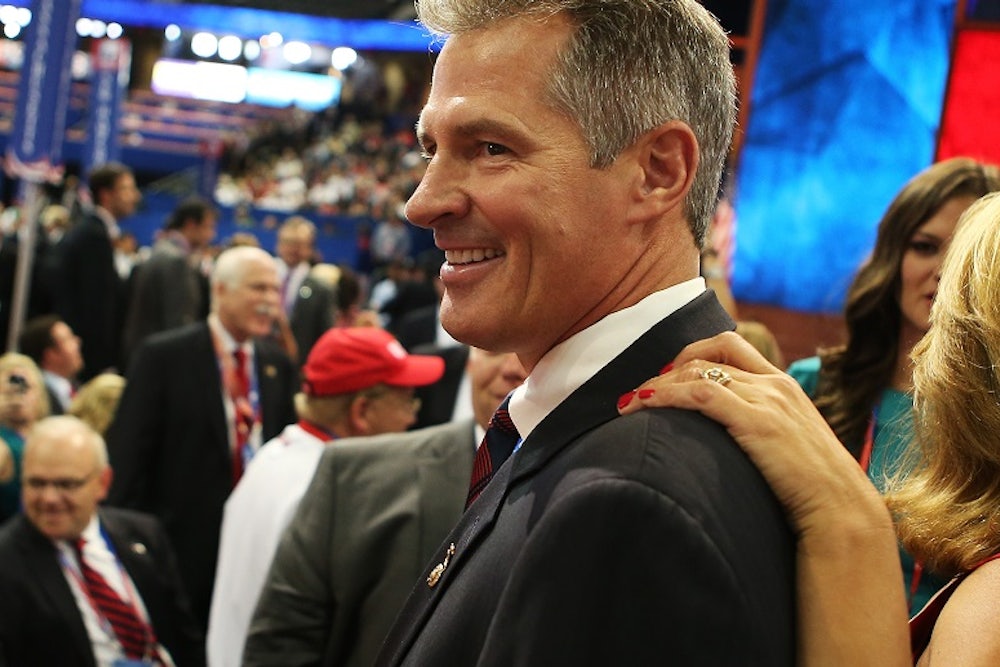So Scott Brown is running for senator in New Hampshire. Well, not yet—not officially. After a tortuously long deliberation, this weekend brought the announcement that he still hasn’t formally declared his candidacy, only formed an exploratory committee and gave a speech assailing incumbent Democrat Jeanne Shaheen. Realistically, however, the writing’s on the wall: The former Massachusetts senator has tapped a local GOP wise man to head up his almost-campaign, and will no longer contribute political commentary to Fox News. Zany and unelectable former Senator Bob Smith is his sole potential primary opponent who rises above Joe Blow status, and the only possibility Brown is “exploring” is which of his formal barn coats to don while celebrating his nomination victory.
I was among the teeming hordes who called for Brown to extend the electoral career that Massachusetts voters had tired of so quickly. He wasn’t, after all, pulling a full-on Bobby Kennedy Carpetbag Deluxe; the lifelong New Englander has a long association with the state, one which he will surely tout at every opportunity in the months to come. But I’d cheer Brown’s chutzpah even if he were running in Hawaii or Texas. Legislating, and whom we choose to do it, should be about an individual’s ability to write and pass sound law, not scarf down garbage plates at the local county fair.
Problem is, in his three years as Massachusetts senator he did little to distinguish himself, either in terms of meaningful legislation or oversight. The one indelible mark he left was to seriously weaken the Dodd-Frank financial regulation bill by stripping out a $19 billion bank tax and softening the “Volcker rule.” Whatever it meant to be a “Scott Brown Republican,” as he famously promised, he was in practice an enabler of the most obstructionist GOP tactics, voting loyally to maintain filibusters on Democratic legislation and nominees. After his 2012 defeat to Elizabeth Warren, it’s obvious in hindsight that his greatest accomplishment was to be elected in the first place, in a combination of savvy campaigning and dumb luck that depended heavily on public distaste for healthcare reform in early 2010.
To his credit, Brown seems to understand this, which explains everything about his Granite State rollout thus far. The 90-second video he released Friday was filled with jabs at the Affordable Care Act (and Shaheen, who supported it). “If we don’t like Obamacare, we can get rid of it,” he promised, a line that seemed more suited to the midterm elections of 2010 than those of 2014. Public disapproval of the law has of course spiked since its bungled unveiling at the end of last year, and Republicans across the country will be testing the issue’s potency before November. Still, attacks on “Obamacare Democrats” sounds more like a Scott Brown Greatest Hits collection than a campaign strategy in an increasingly blue state.
Even if New Hampshire needs an Obamacare Avenger, it's not clear whether Brown is the best man for the job. Though he owed his Massachusetts victory in large part to off-year outrage against the Affordable Care Act, his objection to the bill was one of circumstance, not based on first principles. Instead of opposing the policy of universal coverage as such, Brown pointed out that Massachusetts had already reformed its healthcare market (thanks to fellow Republican Mitt Romney), and therefore shouldn’t have to subsidize the losers in other states who couldn’t keep their own house in order. This parochial outlook allowed him to couch his opposition in a useful exceptionalism, but was essentially a dodge and a huge middle finger to the uninsured in places like New Hampshire, along with the rest of the country.
The voters in all those other states could one day be as relevant to Brown as those in New Hampshire. It has been widely reported that he yearns to be president someday. But to entertain the idea that Brown's presidential material is to overlook the long list of potentially disqualifying factors that would arise long before anyone examined his record on the issues: The carpetbagging; his reputation as a Massachusetts moderate, which would be anathema to the Republican base, whether or not it was deserved; his loss to a progressive champion like Warren; his idiosyncratic use of Twitter. And these are just manifestations of the profound and reassuring mediocrity of Brown himself—an amiable goof and political flyweight, something like George W. Bush without the money or institutional advantages. He’s the fun guy, the class-clown town selectman who throws awesome cookouts. Not the guy with the nuclear codes.
But we’re getting ahead of ourselves. Let him finally—finally!—declare and run in New Hampshire before we start evaluating his chances in 2016 or 2020. And if he does make a bid for the White House (may God be so generous to satirists) and falls short, that’s no problem, either. He can just turn the truck north and run for Canadian prime minister.
